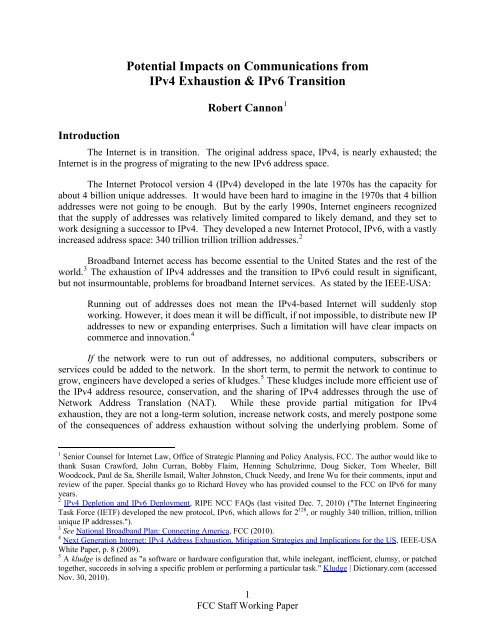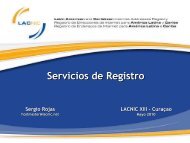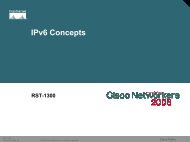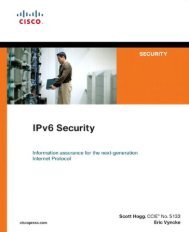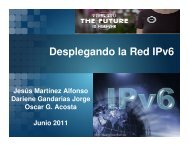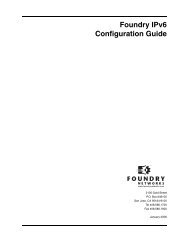IPv4 Exhaustion, IPv6 Transition, - Saudi Arabia IPv6 Task Force
IPv4 Exhaustion, IPv6 Transition, - Saudi Arabia IPv6 Task Force
IPv4 Exhaustion, IPv6 Transition, - Saudi Arabia IPv6 Task Force
Create successful ePaper yourself
Turn your PDF publications into a flip-book with our unique Google optimized e-Paper software.
IntroductionPotential Impacts on Communications from<strong>IPv4</strong> <strong>Exhaustion</strong> & <strong>IPv6</strong> <strong>Transition</strong>Robert Cannon 1The Internet is in transition. The original address space, <strong>IPv4</strong>, is nearly exhausted; theInternet is in the progress of migrating to the new <strong>IPv6</strong> address space.The Internet Protocol version 4 (<strong>IPv4</strong>) developed in the late 1970s has the capacity forabout 4 billion unique addresses. It would have been hard to imagine in the 1970s that 4 billionaddresses were not going to be enough. But by the early 1990s, Internet engineers recognizedthat the supply of addresses was relatively limited compared to likely demand, and they set towork designing a successor to <strong>IPv4</strong>. They developed a new Internet Protocol, <strong>IPv6</strong>, with a vastlyincreased address space: 340 trillion trillion trillion addresses. 2Broadband Internet access has become essential to the United States and the rest of theworld. 3 The exhaustion of <strong>IPv4</strong> addresses and the transition to <strong>IPv6</strong> could result in significant,but not insurmountable, problems for broadband Internet services. As stated by the IEEE-USA:Running out of addresses does not mean the <strong>IPv4</strong>-based Internet will suddenly stopworking. However, it does mean it will be difficult, if not impossible, to distribute new IPaddresses to new or expanding enterprises. Such a limitation will have clear impacts oncommerce and innovation. 4If the network were to run out of addresses, no additional computers, subscribers orservices could be added to the network. In the short term, to permit the network to continue togrow, engineers have developed a series of kludges. 5 These kludges include more efficient use ofthe <strong>IPv4</strong> address resource, conservation, and the sharing of <strong>IPv4</strong> addresses through the use ofNetwork Address Translation (NAT). While these provide partial mitigation for <strong>IPv4</strong>exhaustion, they are not a long-term solution, increase network costs, and merely postpone someof the consequences of address exhaustion without solving the underlying problem. Some of1 Senior Counsel for Internet Law, Office of Strategic Planning and Policy Analysis, FCC. The author would like tothank Susan Crawford, John Curran, Bobby Flaim, Henning Schulzrinne, Doug Sicker, Tom Wheeler, BillWoodcock, Paul de Sa, Sherille Ismail, Walter Johnston, Chuck Needy, and Irene Wu for their comments, input andreview of the paper. Special thanks go to Richard Hovey who has provided counsel to the FCC on <strong>IPv6</strong> for manyyears.2 <strong>IPv4</strong> Depletion and <strong>IPv6</strong> Deployment, RIPE NCC FAQs (last visited Dec. 7, 2010) ("The Internet Engineering<strong>Task</strong> <strong>Force</strong> (IETF) developed the new protocol, <strong>IPv6</strong>, which allows for 2 128 , or roughly 340 trillion, trillion, trillionunique IP addresses.").3 See National Broadband Plan: Connecting America, FCC (2010).4 Next Generation Internet: <strong>IPv4</strong> Address <strong>Exhaustion</strong>, Mitigation Strategies and Implications for the US, IEEE-USAWhite Paper, p. 8 (2009).5 A kludge is defined as "a software or hardware configuration that, while inelegant, inefficient, clumsy, or patchedtogether, succeeds in solving a specific problem or performing a particular task." Kludge | Dictionary.com (accessedNov. 30, 2010).1FCC Staff Working Paper


